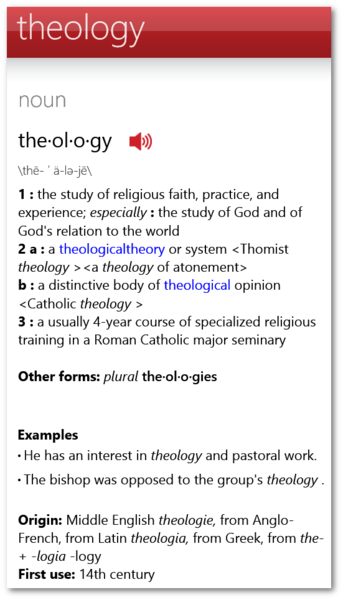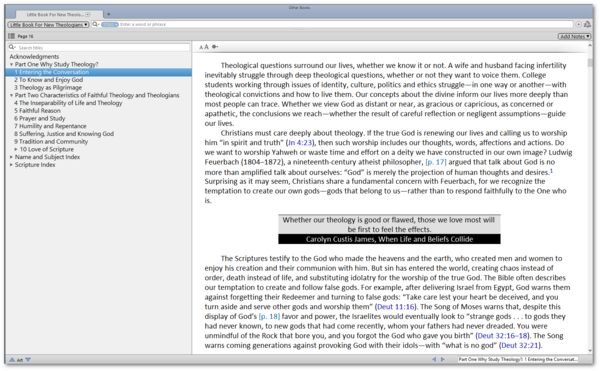
Okay, confession: I never read it. Thinking back to that time in my life, I wondered why I never read it. I mean, it’s a fairly short book–only about 57 pages according to Amazon.com. So, I found it on my shelf and opened it to the first chapter. Here’s the first paragraph:
Johann Tobias Beck, the old professor at Tubingen, now and then used to interweave asides into his lectures, thereby transforming the lecture platform into a pulpit. In my opinion, something similar cannot hurt us teachers and students of the present day. As often before, I am attempting here excursi of this kind. The reader will kindly understand this fact and be lenient about it, because these obiter dicta, both in form and content, are very sharply to be distinguished from the style and matter of formal lectures in theology itself. Keep in mind that such digressions must necessarily be spoken off guard, while the lecture proper cannot dispense with its safeguards.
The 40-something me can still remember the me of my 20-somethings; and after reading the above, I have a hunch or two as to why I never finished Thielicke’s book.
For better or worse, today’s a new day; and while the older generations always frown upon those who are coming up behind them, there’s no getting away from the fact every generation has its own defining characteristics and view of the world. Glancing through Thielicke’s book again after all these years, I acknowledge that it is of great value, and I wish I had read it all those years ago. Nevertheless, knowing what I know of today’s entering seminary students, I have no doubt that if I was not ready to dive into it 20-something years ago, most students of today will probably be even more reluctant.
Thus, we come to a new book for a new generation. Kelly M. Kapic, Professor of Theological Studies at Covenant University, has written A Little Book for New Theologians: Why and How to Study Theology in the tradition of and for similar purposes as Thielicke’s original book. However, even the 40-something me likes Kapic’s first paragraph or two better:
Tell me about God.
For some people the question of whether or not God exists is a painful and haunting uncertainty not easily dismissed. But for most people the question is not whether God exists, but what is God like. Not whether there is a deity, but how many, and which one(s). How do we know God? Can God be trusted? Does God care? And is God good?
Whenever we speak about God we are engaged in theology. The term “theology” means a word (logos) about God (theos), so when anyone speaks about God, whether that person dropped out of high school or completed a PhD in philosophy, he or she is engaged in theology. Theology is not reserved for those in the academy; it is an aspect of thought and conversation for all who live and breathe, who wrestle and fear, who hope and pray.
I have to tell you–these words grab me from the very beginning and make me want to read more. Although Kapic, like Thielicke before him, is writing to the same kind of audience–those who are beginning their ministerial/theological studies–it is the older me–the one who has already gone through those studies–who appreciates Kapic’s words, especially those near the end of the second paragraph, more than I probably would have when I was younger. I have long felt that the church at large is too segregated from the academy meant for supposed theological “professionals.” All people, regardless of formal study and training, regularly engage in theology as defined by Kapic as “Whenever we speak” (and I would add think) “about God.” And we are all capable of engaging in ministry, regardless of preparation, as well.
Kapic’s A Little Book for New Theologians was written in the context of his own interaction with new theological students in introductory doctrine classes. It was fine-tuned over a number of years as he taught and engaged in conversation with these individuals. He writes in the acknowledgments section of the book:
I hope students might read this book near the beginning of their theological studies, whether such education takes place formally within a classroom or informally as one sits reading and reflecting. My prayer is that this book might, in some small way, help new theologians avoid the strong dichotomies of theological detachment.
I would suggest that Kapic’s Little Book is the kind of reading that is suitable for all believers, regardless of their level of training and years of experience. This is actually the kind of book that we probably all need to read and reread every now and then to keep ourselves grounded, humble and approachable to those with whom we interact, teach and minister. It would make a great gift to give the current generation of “new theologians” but is also a good reading for the “old” theologians as well.
A Little Book for New Theologians by Kelly M. Kapic runs about twice as long as Thielicke’s work but is probably much more accessible to today’s generation. The Accordance version of the title includes the following tagged search fields: Titles, English Content, Scripture, Transliteration, and Page Numbers. The Name, Subject and Scripture indexes of the original print edition are included as well.
For a limited time, it is available at the introductory pricing of $6.90 (regular price $7.90).
|
A Little Book for New Theologians: Regular Price $7.90 |
One more thing… I hope that I have not offended anyone who was greatly moved and/or influenced in the past by Helmut Thielicke’s now-classic work, A Little Exercise for Young Theologians. If anything, after pulling it off the shelf and thumbing through it, I feel compelled to read it now, even after all these years. I would imagine that reading it and Kapic’s newer book back to back would make for great comparison and reflection.



